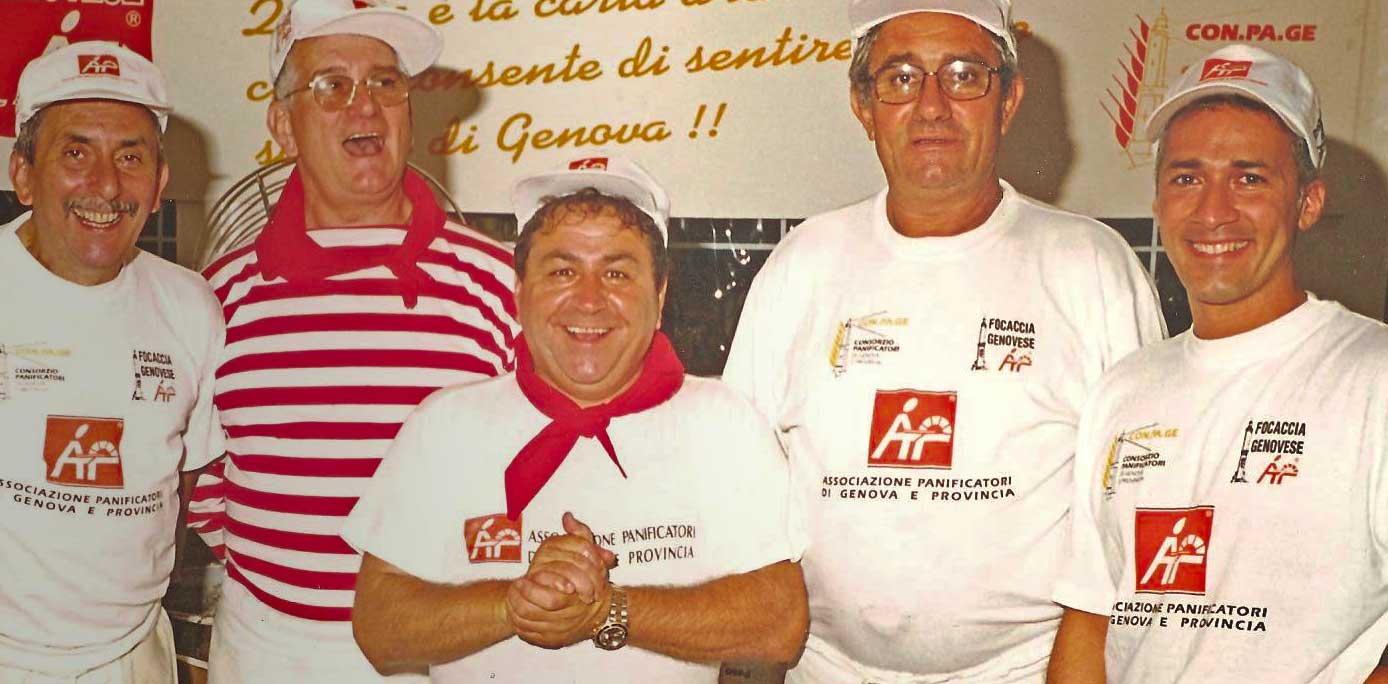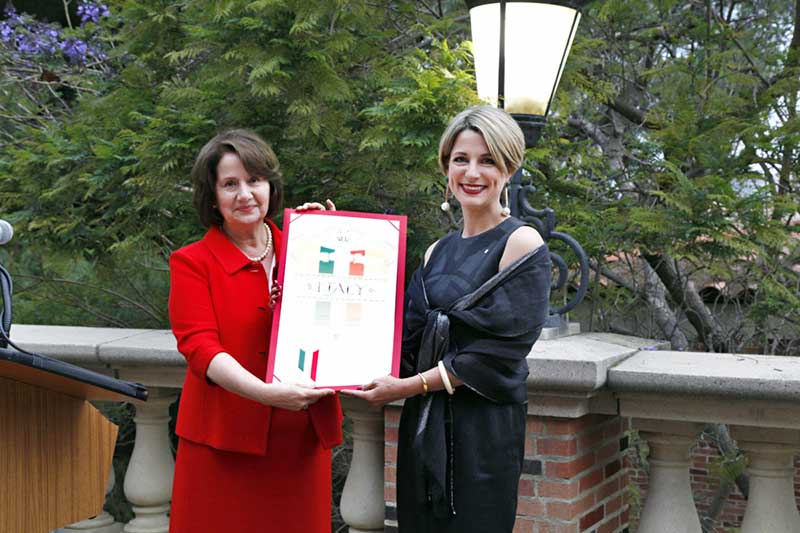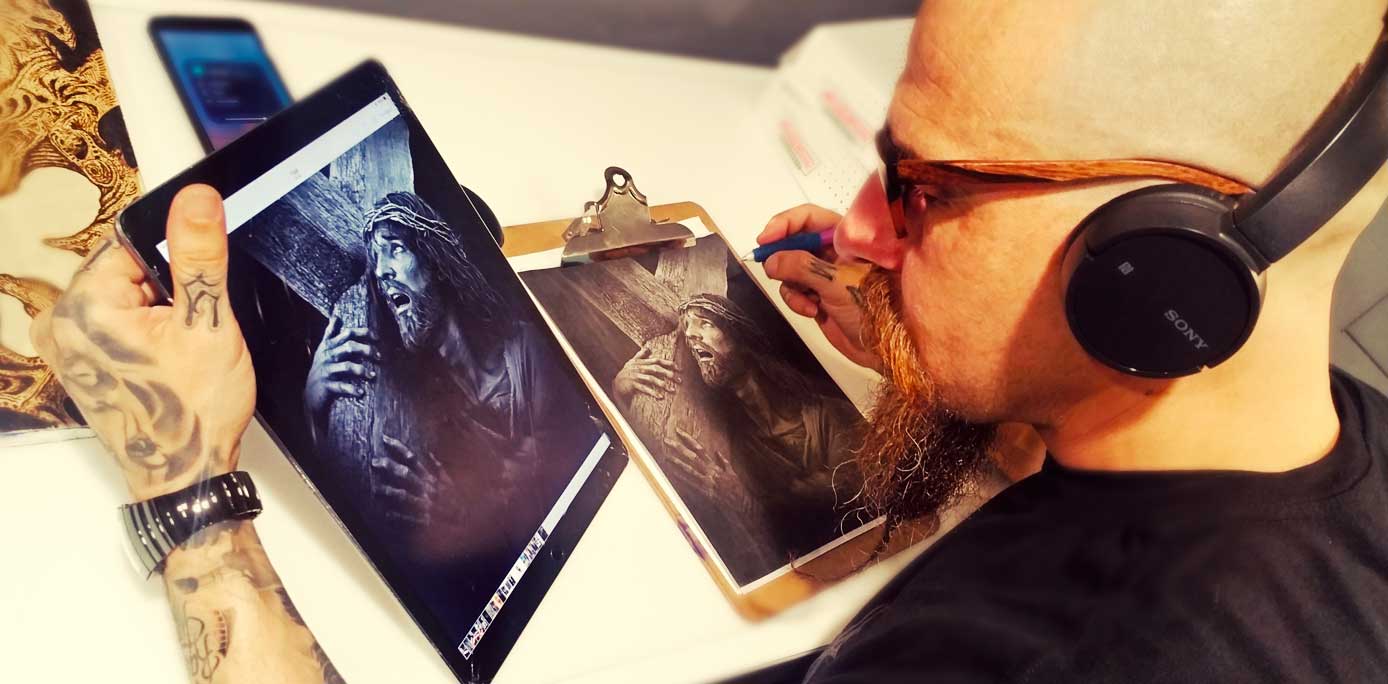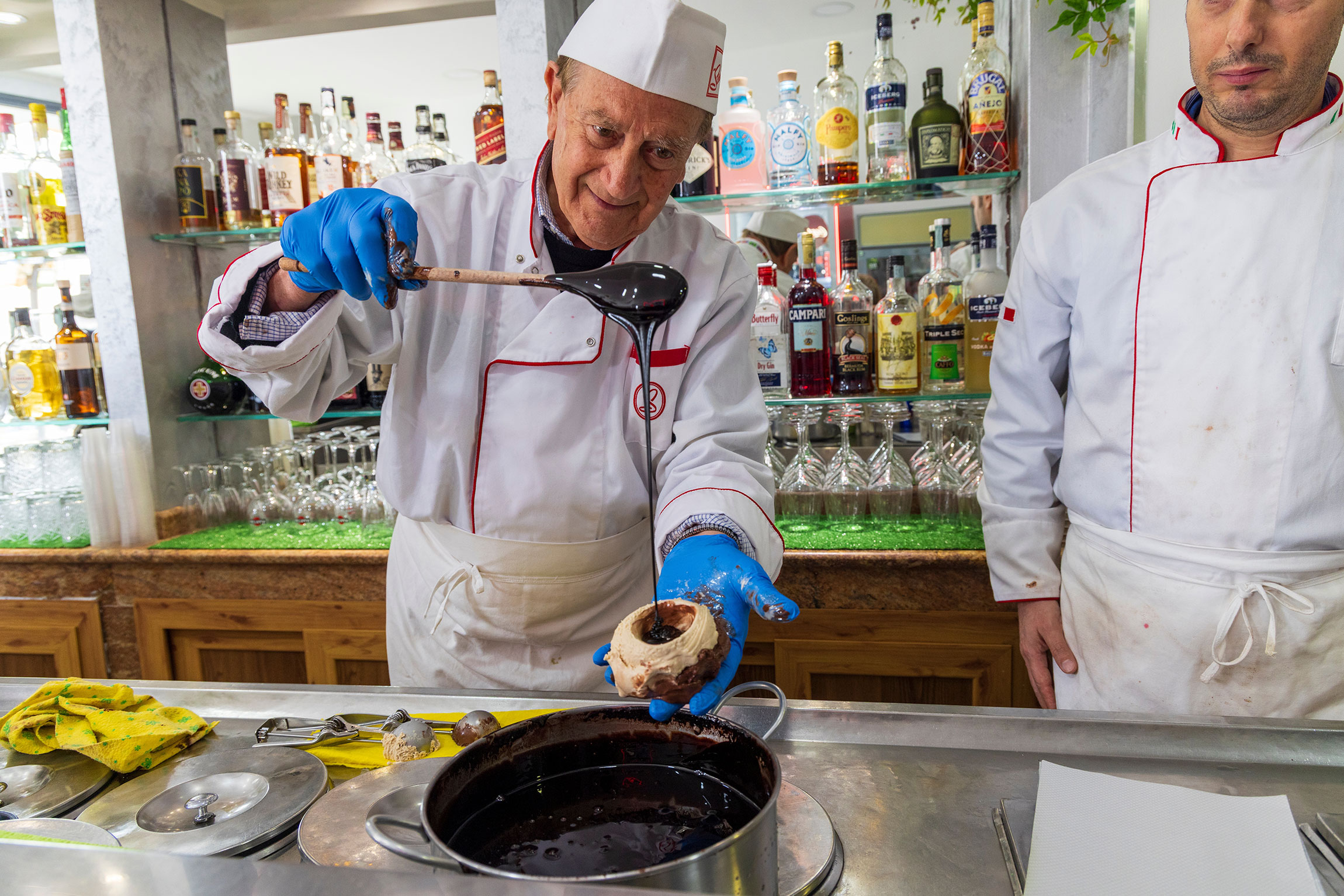Pasta, pane, pizza, focaccia… the crown of the realm of carbs is certainly held by Italian bakers, who made miracles, for centuries, with just some water, flour, yeast and salt. Since the times of the Roman Empire bread and all its derivates literally ruled the Italian tables, becoming a kind of signature product of our cultural traditions all over the planet.
Even during these peculiar times of gluten-free, natural-wheat, super-healthy, alternative-diet trends, many modern nutritionists have been clearly able to recognize the valuable contribute that the Italian traditional bakery brought to the whole world: developing to perfection something that has been the true foundation of our ancestors’ daily diet. In fact now more than ever the American people are craving to discover some of the finest Italian bakery products, made by the ones who inherited that precious knowledge from generations of food artisans.
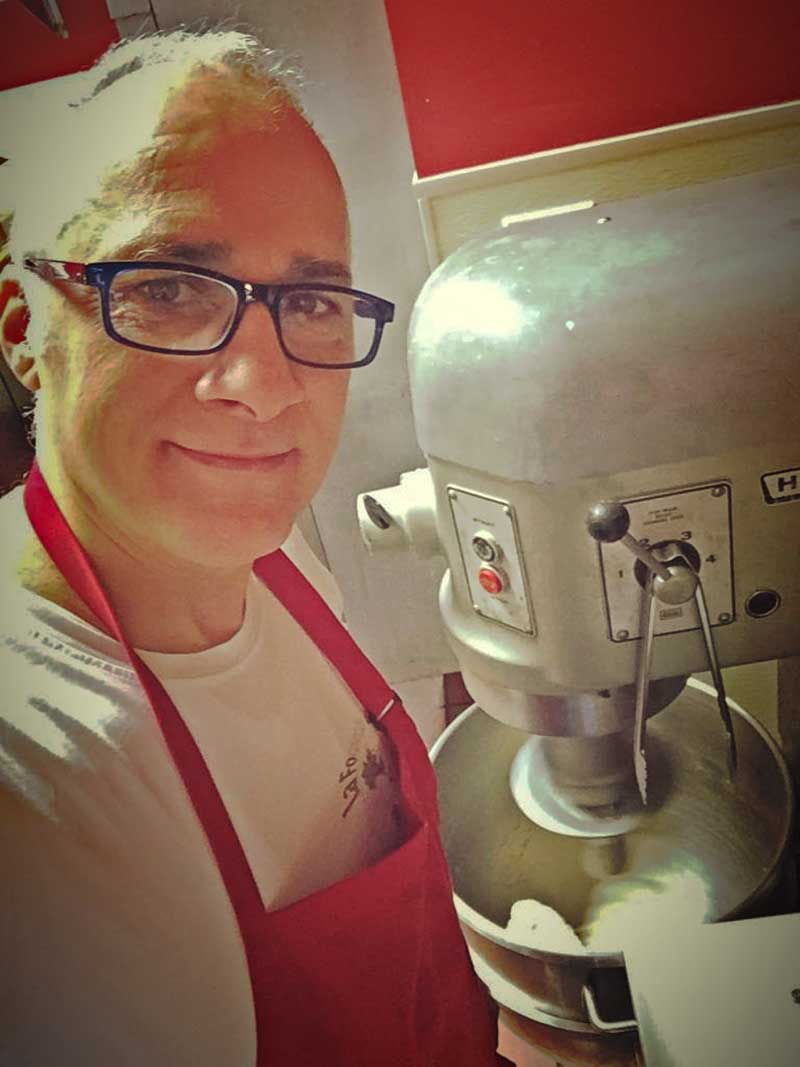
Milo Torrisi has brought his Genoese style baking to LA © Maurizio Rami
Following the cultural rediscovering and the new global appreciation of traditional Italian bakery, expert baker Carmelo Torrisi has been urgently called to the United States, in order to let him bring the professional fruits of his fine baking art to the now-happier Californian customers. Known simply as Milo (almost nobody calls him by his birth name), a whole life with his expert hands into the dough, he actually comes from generations of bakers: his father, a humble gentleman, moved during his young years from Sicily to Pegli, a fishermen town close to Genoa, where Milo was born fifty years ago.
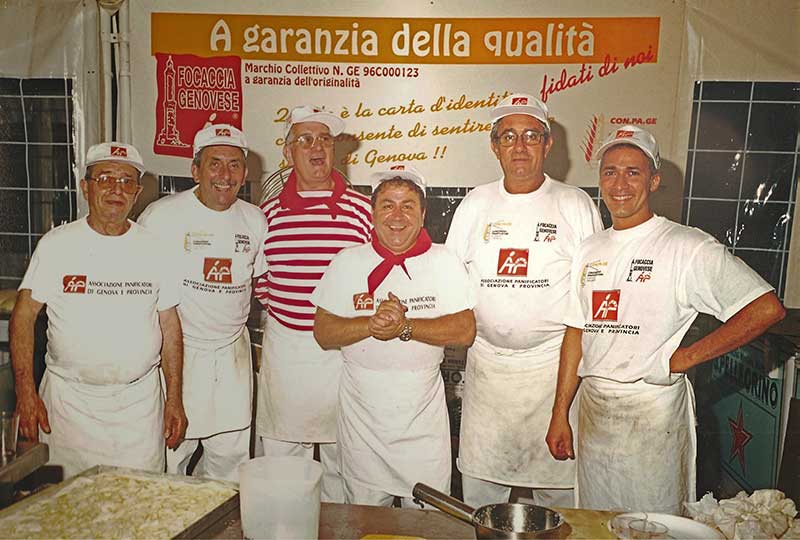
Since when he was a kid, he saw his father making everyday masterpieces of bakery such as focaccia genovese, panettone ligure, crostate and pasticcini. Growing in the family’s baking laboratory, he quickly stole his father’s secrets about the raw ingredients, the perfect cooking time, the right quantities. In the meanwhile, Milo was also attending the University of Genoa, in order to get an engineering master degree. At the age of 26, very close to obtain his Bachelor, he left the studies to help his father and he eventually took over the family business, bringing it to the very top. Everybody in Pegli loved and bought Milo’s bakery products so much that he started getting delivery requests from other bakeries in Genoa, he began cooking and catering for big companies and he also participated to international baking contests all over the world.
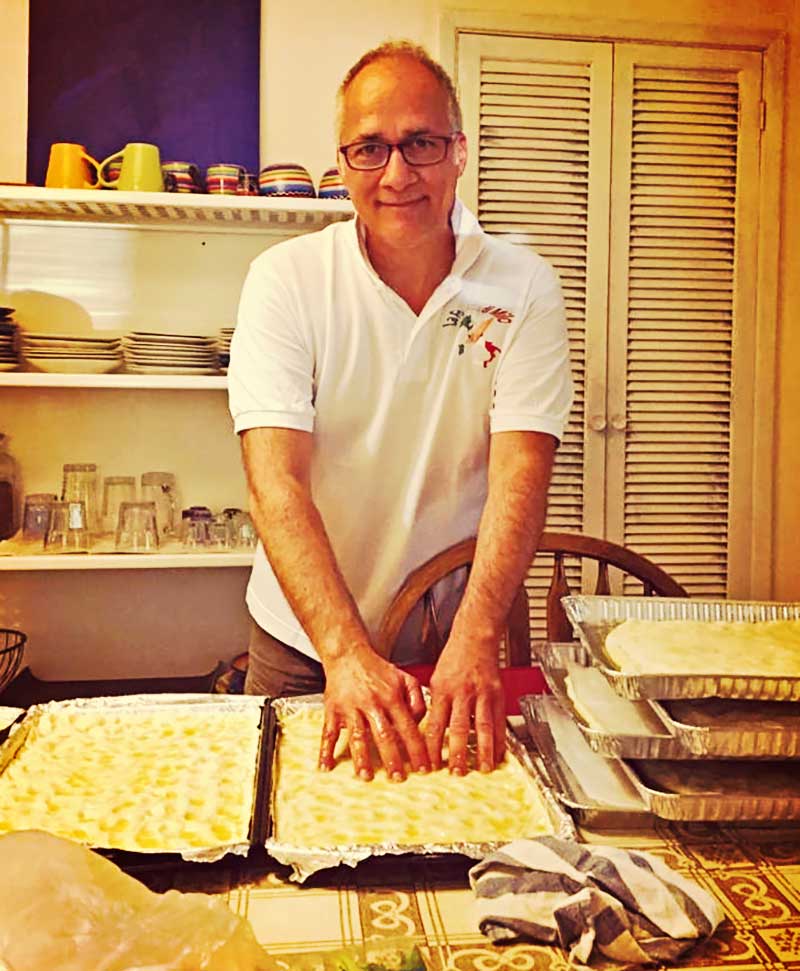
Since when he was a kid, he saw his father making everyday masterpieces of bakery such as focaccia genovese, panettone ligure, crostate and pasticcini © Maurizio Rami
On October 2000 he participated to the prestigious Salone del Gusto in Turin winning an important competition, on April 2002 he flew to Tokyo attending one of the world’s most important food exhibitions to compete against other international bakers and placing himself within the first best bakers worldwide. In 2004 he obtained the prestigious official certificate from Slow Food, the famous international Association that inspires individuals and communities to change the world through food that is good, clean and fair for all.
How it happened that you stopped your university studies and became a professional baker?
Between 1996 and 1998 my father started being very ill and he wasn’t able anymore to run the family business: I felt that my responsibility as a son was to help him in any possible way, in order to keep alive what he built with lots of sacrifices. So I started to work at the bakery everyday.
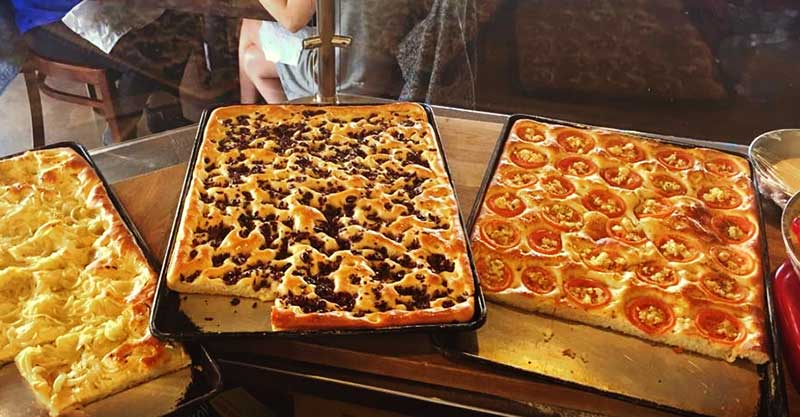
How’s the life of a successful, traditional baker?
It is pretty demanding and you have to be the first who wakes up and the last who goes to sleep. On an average day we work between 12 and 14 hours because you have to wake up earlier than anybody and start baking so that you can sell freshly made products as the shop opens at 07:30 am.
When did you learn the ancient art of bakery?
I actually started learning when I first stepped into my father’s bakery! I saw him working together with his employees, creating masterpieces with just some simple ingredients, controlling the cooking time and mastering the art of bakery in a humble yet firm way. Then I wanted to further develop my skills and, when my father got ill and I took over the business, I also made lots of researches to study the traditional recipes.
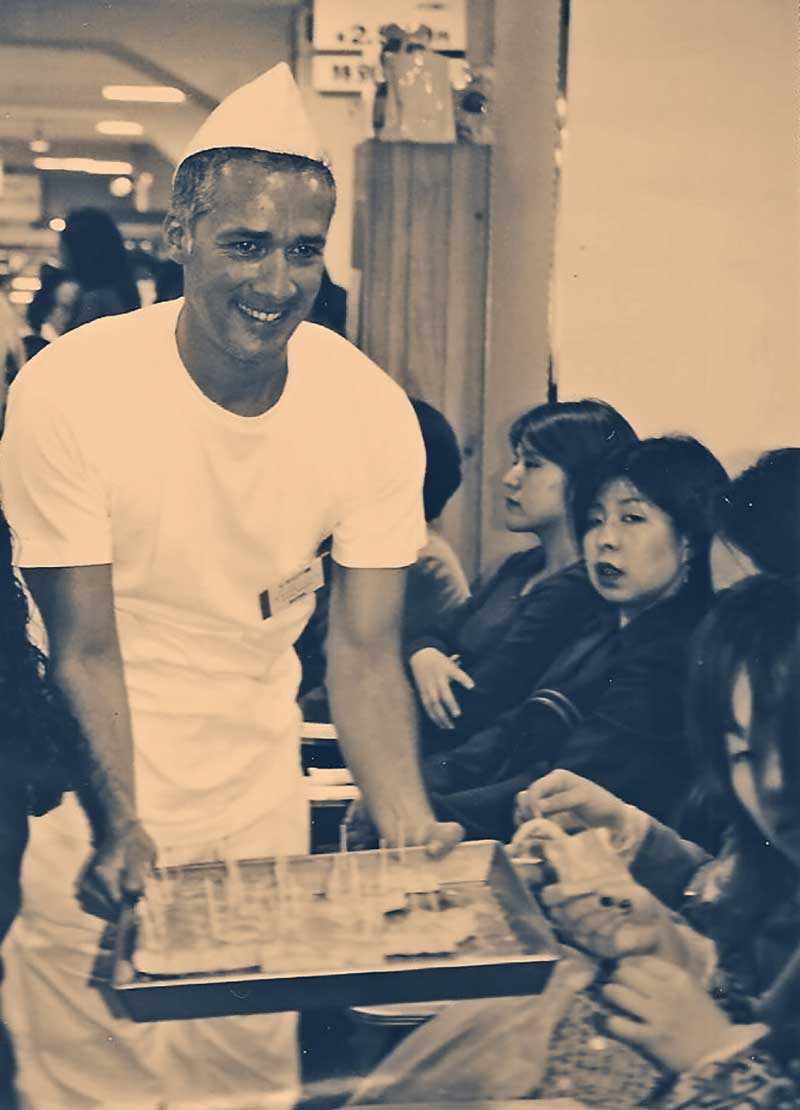
Known simply as Milo (almost nobody calls him by his birth name), a whole life with his expert hands into the dough, he actually comes from generations of bakers © Maurizio Rami
Do you strictly follow the traditional way of baking that you learned from your parents?
Everything changes with the passing of time and, even if traditional Italian baking has been brought to perfection through centuries of artisanal job, there’s still a lot of room for improvements. For example, in my case I try to merge the modern and latest dietary habits with the oldest Italian traditions: keeping the same recipes but changing some of the basic ingredients.
Can you better explain this cultural and culinary merging?
The traditional Italian custard, that everybody usually loves so much, has always been made with the red of the eggs: but we all know how full of cholesterol that is. So after some experiments I came up with a new version that doesn’t use such ingredient and it’s way lighter, keeping intact the same appealing vanilla flavor. Another case is the one about my focaccia Genovese: the traditional one has some lard in the dough, in order to make it smoother and more compact. But all those fats are truly unnecessary, so I created my own version of that recipe, using only 100% Italian extra-virgin olive oil. The result is amazingly soft, yummy, tasteful and definitely not harmful to our health.
What’s your plan to let the American people know and appreciate your products?
I am currently in touch with a great, wonderful Italian community in Los Angeles: some are even coming from the same area in Italy, and many of them already love my baking products. I do strongly believe that the time is right to propose to the world something new, but based on an ancient tradition. Since I started working in my father’s bakery I’ve always tried to find a common ground between innovation and tradition. I think I eventually found the right way to conquer everybody’s heart and palate!
Would you love to pass your knowledge to the new generations of bakers?
Of course I’d love to and I am already doing it. I teach to students of all grades, in order to keep the tradition and culture alive, I also give seminars all over the world and I am an executive member of the Bakers Association of Genoa.
How hard is it to balance your job and your family?
It’s not easy but, after all those years, I think I managed to handle it perfectly! Thanks to my devoted wife Mariella we’ve been able to raise our two lovely daughters. And now the Italian Community of LA is calling me because they’d love to have my bakery products available in California.
Pasta, pane, pizza, focaccia … lo scettro del regno dei carboidrati è certamente in mano ai panettieri italiani, che hanno fatto miracoli, per secoli, usando solo un po’ d’acqua, di farina, di lievito e sale. Fin dai tempi dell’Impero Romano il pane e tutti i suoi derivati hanno letteralmente dominato le tavole italiane, diventando una sorta di prodotto distintivo delle nostre tradizioni culturali in tutto il pianeta.
Anche in queste epoche caratterizzate da tendenze alimentari gluten-free, di grani naturali, super-salutari e di diete alternative, molti nutrizionisti moderni sono stati chiaramente in grado di riconoscere il prezioso contributo che la panetteria tradizionale italiana porta in tutto il mondo: sviluppando alla perfezione qualcosa che è stato il vero fondamento della dieta quotidiana dei nostri antenati. Infatti, oggi più che mai, il popolo americano ha voglia di scoprire alcuni dei migliori prodotti da forno italiani, realizzati da coloro che hanno ereditato quella preziosa conoscenza da generazioni di artigiani del cibo.
Seguendo la riscoperta culturale e il nuovo apprezzamento globale della panetteria italiana tradizionale, l’esperto panettiere Carmelo Torrisi è stato chiamato con urgenza negli Stati Uniti, perché porti i frutti professionali della sua arte culinaria ai clienti californiani, ora più felici. Conosciuto semplicemente come Milo (quasi nessuno lo chiama con il suo nome di nascita), tutta una vita con le esperte mani in pasta, viene in realtà da generazioni di fornai: suo padre, umile gentiluomo, si è trasferito in gioventù dalla Sicilia a Pegli, cittadina di pescatori vicino a Genova, dove Milo è nato cinquant’anni fa.
Sin da bambino ha visto suo padre tirare fuori dal forno capolavori quotidiani come la focaccia genovese, il panettone ligure, la crostata e i pasticcini. Cresciuto nel forno di famiglia, ha rapidamente rubato i segreti di suo padre sulle materie prime, il tempo di cottura perfetto, le giuste quantità. Nel frattempo, Milo frequentava l’Università di Genova, per conseguire una laurea in ingegneria. All’età di 26 anni, molto vicino a laurearsi, ha lasciato gli studi per aiutare suo padre e alla fine si è fatto carico dell’azienda di famiglia, portandola ai massimi livelli. Tutti a Pegli hanno amato e acquistato i prodotti da forno di Milo così tanto che ha iniziato a ricevere richieste di consegna da altri forni di Genova, a cucinare e fare catering per grandi aziende e ha anche partecipato a concorsi internazionali di panificazione in tutto il mondo.
Nell’ottobre del 2000 ha partecipato al prestigioso Salone del Gusto di Torino vincendo un importante concorso, nell’aprile del 2002 è volato a Tokyo partecipando a una delle più importanti fiere di settore del mondo per competere con altri panificatori internazionali e posizionarsi tra i migliori panificatori di tutto il mondo. Nel 2004 ha ottenuto il prestigioso certificato ufficiale da Slow Food, la famosa associazione internazionale che ispira gli individui e le comunità a cambiare il mondo attraverso il cibo buono, pulito e giusto per tutti.
Come mai ha interrotto gli studi universitari per diventare un fornaio professionista?
Tra il 1996 e il 1998 mio padre cominciò a stare molto male e non era più in grado di gestire l’azienda di famiglia: sentivo che la mia responsabilità come figlio era di aiutarlo in ogni modo possibile, per mantenere vivo ciò che aveva costruito con un sacco di sacrifici. Così ho iniziato a lavorare in panetteria tutti i giorni.
Com’è la vita di un fornaio tradizionale di successo?
È piuttosto impegnativa: devi essere il primo a svegliarti e l’ultimo ad andare a dormire. In un giorno tipo lavoriamo tra le 12 e le 14 ore perché bisogna svegliarsi prima di chiunque altro e iniziare a cuocere in modo da poter vendere i prodotti appena fatti quando il negozio apre alle 07:30.
Quando ha imparato l’antica arte della pasticceria?
In realtà ho iniziato a studiare quando sono entrato nella panetteria di mio padre! L’ho visto lavorare insieme ai suoi dipendenti, creare capolavori con ingredienti semplici, controllare i tempi di cottura e padroneggiare l’arte della panificazione in modo umile ma sicuro. Poi ho voluto sviluppare ulteriormente le mie capacità e, quando mio padre si è ammalato e mi sono fatto carico dell’azienda, ho fatto anche molte ricerche per studiare le ricette tradizionali.
Segue rigorosamente il metodo tradizionale di cottura che ha imparato dai suoi genitori?
Tutto cambia con il passare del tempo e, anche se la cottura tradizionale italiana è stata portata alla perfezione attraverso secoli di lavoro artigianale, c’è ancora molto spazio per i miglioramenti. Ad esempio, nel mio caso, cerco di unire le moderne e più recenti abitudini alimentari con le più antiche tradizioni italiane: mantenendo le stesse ricette ma cambiando alcuni degli ingredienti base.
Può spiegare meglio questa fusione culturale e culinaria?
La tradizionale crema pasticcera italiana, che tutti amano così tanto, è sempre stata fatta con il rosso delle uova: ma sappiamo tutti quanto sia ricca di colesterolo. Quindi, dopo alcuni esperimenti, mi è venuta in mente una nuova versione che non utilizza tale ingrediente ed è molto più leggera, mantenendo intatto lo stesso accattivante sapore di vaniglia. Un altro caso è quello della mia focaccia genovese: quella tradizionale ha il lardo nell’impasto, per renderla più soffice e compatta. Ma tutti quei grassi sono veramente inutili, così ho creato la mia versione di quella ricetta, usando solo olio extra vergine di oliva italiano al 100%. Il risultato è incredibilmente morbido, squisito, gustoso e sicuramente non dannoso per la nostra salute.
Qual è il suo piano per far conoscere e apprezzare i suoi prodotti agli americani?
Sono attualmente in contatto con una grande e meravigliosa comunità italiana a Los Angeles: alcuni arrivano addirittura dalla stessa zona d’Italia e molti di loro amano già i miei prodotti da forno. Credo fermamente che sia giunto il momento di proporre al mondo qualcosa di nuovo, ma basato su una tradizione antica. Da quando ho iniziato a lavorare nel forno di mio padre ho sempre cercato di trovare un terreno comune tra innovazione e tradizione. Penso che alla fine ho trovato il modo giusto per conquistare il cuore e il palato di tutti!
Le piacerebbe trasmettere le sue conoscenze alle nuove generazioni di panificatori?
Certo che mi piacerebbe e lo sto già facendo. Insegno a studenti di tutti i livelli, per mantenere viva la tradizione e la cultura, offro anche seminari in tutto il mondo e sono un membro esecutivo dell’Associazione dei panettieri di Genova.
Quanto è difficile bilanciare lavoro e famiglia?
Non è facile ma, dopo tutti questi anni, penso di essere riuscito a gestire entrambe le cose perfettamente! Grazie alla mia devota moglie Mariella siamo stati in grado di crescere le nostre due adorabili figlie. E ora la comunità italiana di Los Angeles mi chiama perché a loro piacerebbe avere i miei prodotti da forno in California.





